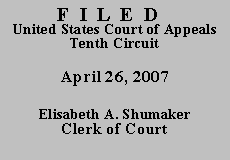

| NANCY L. WILLIAMSON;
JOHN S. WILLIAMSON,
Plaintiffs-Appellants, v. JACKIE SENA; CHRIS ROBINSON; FIDEL ATENCIO; MIKE ATHERS; KENNY WYATT; SHARON LEE PARKER, Individually, Defendants-Appellees. |
|
As to Nancy Williamson's claims, the district court granted partial summary judgment to Defendants, dismissing the complaint with prejudice as to all claims except a Fourth Amendment claim. It granted Nancy Williamson permission to file an amended complaint detailing the factual basis for her Fourth Amendment claim only. When she failed to do so, the district court entered judgment in favor of Defendants.
We review a grant of summary judgment de novo, applying the same standards as the district court. Simms v. Okla. ex. rel. Dep't of Mental Health & Substance Abuse Servs., 165 F.3d 1321, 1326 (10th Cir. 1999). Summary judgment is appropriate only "if the pleadings, depositions, answers to interrogatories, and admissions on file, together with the affidavits, if any, show that there is no genuine issue as to any material fact and that the moving party is entitled to a judgment as a matter of law." Fed. R. Civ. P. 56(c). In applying this standard, "we view the evidence and draw reasonable inferences therefrom in the light most favorable to the nonmoving party." Simms, 165 F.3d at 1326 (citation omitted).
Having carefully reviewed the record, we conclude all claims preserved for appeal are without merit and thus affirm the judgment of the district court.(1) Because we affirm for substantially the same reasons as stated in the district court's thorough and well-reasoned memorandum opinion and order, we decline to analyze each individual claim in this disposition.
Defendants move for sanctions under 28 U.S.C. § 1912 and Rule 38 of the Federal Rules of Appellate Procedure, arguing the instant appeal is frivolous. Nancy Williamson's response to the motion for sanctions simply rehashes the discredited arguments in her opening brief, including her assertions that she is not a "taxpayer," that collection of income taxes is not authorized upon the earnings of citizens of New Mexico, and that no authorized statute supports the "kind of tax 1040" allegedly imposed by the Internal Revenue Service.(2) Defendants request sanctions in the amount of $8,000, contending that the Government expends an average of $11,000 in attorney salaries and other costs to defend a frivolous tax appeal.(3) They further note that previous sanctions of $1,500 did not deter the Williamsons from filing the present appeal. See Williamson v. United States, No. 99-2294, 2000 WL 676053, at *2 (10th Cir. May 24, 2000). We agree the instant action is a frivolous appeal deserving penalty, and impose sanctions of $8,000.
Williamsons have filed numerous actions in federal district court and U.S. Tax Court seeking to avoid paying their lawful income taxes.(4) In view of the fact that prior monetary sanctions alone have not dampened Williamsons' enthusiasm for frivolous litigation, we rely on our "inherent power to regulate federal dockets, promote judicial efficiency, and deter frivolous filings" to impose filing restrictions. Stafford v. United States, 208 F.3d 1177, 1179 (10th Cir. 2000). We hereby enjoin Nancy Williamson and/or her husband, John S. Williamson from: (1) filing any further complaints in the United States District Court for the District of New Mexico containing the same or similar allegations set forth in their complaint in the instant case; (2) filing any further appeals or original actions in this court involving the same or similar allegations set forth in their complaint in the instant case; and (3) filing any new actions or appeals involving tax matters against the United States or its employees until they have certified, under oath, that they have satisfied the monetary sanctions levied herein. Any proceedings filed in this court in violation of these filing restrictions shall be summarily dismissed by the Clerk of this court. The mandate shall issue forthwith.
The judgment of the district court is AFFIRMED.
Entered for the Court
Circuit Judge
*. After examining the briefs and appellate record, this panel has determined unanimously that oral argument would not materially assist the determination of this appeal. See Fed. R. App. P. 34(a)(2); 10th Cir. R. 34.1(G). The case is therefore ordered submitted without oral argument. This order and judgment is not binding precedent, except under the doctrines of law of the case, res judicata, and collateral estoppel. It may be cited, however, for its persuasive value consistent with Fed. R. App. P. 32.1 and 10th Cir. R. 32.1.
1. Nancy Williamson's notice of appeal lists the court order denying her motion for a cease-and-desist order and for damages against the purchaser of property seized from her by the Internal Revenue Service as an issue on appeal. Her failure to argue this issue in her appellate briefs, however, constitutes a waiver of this issue. Abercrombie v. City of Catoosa, 896 F.2d 1228, 1231 (10th Cir. 1990).
2. In an apparent attempt to counter the frivolousness charge, Nancy Williamson makes an argument based on the Paperwork Reduction Act, 44 U.S.C. § 3500-3520. Her complaint, however, does not allege a cause of action based on this statute, and we will not address it on appeal. See Callahan v. Poppell, 471 F.3d 1155, 1161 (10th Cir. 2006) (holding that a claim not alleged in the complaint cannot be raised for the first time on appeal).
3. A declaration by Gretchen M. Wolfinger, counsel for Defendants and a Department of Justice attorney, states that the facts set forth in Defendants' motion are true and correct to the best of her knowledge and belief.
4. See Williamson v. Comm'r, T.C. Memo 1981-721, 43 T.C.M. (CCH) 141, 1981 WL 11099 (Dec. 23, 1981); Williamson v. Comm'r, T.C. Memo 1987-118, 53 T.C.M. (CCH) 287, 1987 WL 40195 (Mar. 3, 1987); United States v. Williamson, No. 95-1153, slip op. (D.N.M. May 7, 1997); Williamson v. United States, 84 F. Supp. 2d 1217 (D.N.M. 1999), aff'd, 215 F.3d 1338 (10th Cir. 2000) (unpublished opinion).